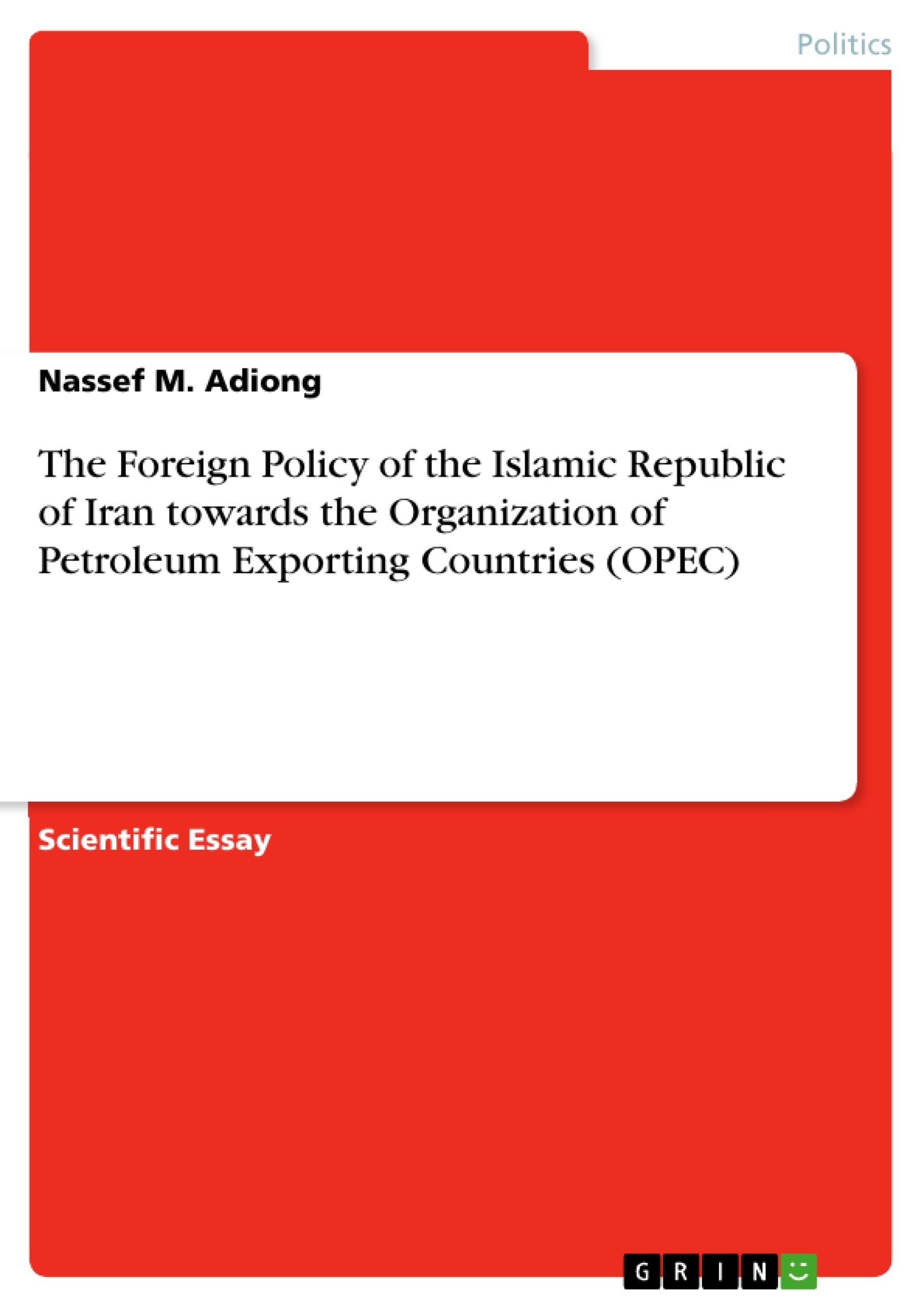The same peculiarity as the first paper was entailed subject to delimitations provided by the syllabus, this study will entirely focus on oil security, its political and economic adversaries concomitant with the foreign policy of Iran towards OPEC. It will explain the dynamics and mechanisms on how policies in Iran are extensively constructed especially in dealings with interstate relations juxtapose to non-state actor like OPEC.
The proponent will concentrate on four aspects:
1.Units of Analysis – intuitively investigate the actors (political elites and eminent religious personalities involved in the making of the foreign policy), the international environment, and varied situations occurred in events that are intertwined or connected in planning and organizing the policies to be implemented.
2.Determinants and Processes – in this aspect, the researcher will expound two classifications, the foreign determinants and the domestic determinants that immensely affect the doings of a foreign policy maker, discussing what are the processes or systems afflicted in each determinant and how do they differ or paralleled.
3.The Acts – will look on the decisions made; observe mobilization of resources and the application of instruments and techniques in advancing Iranian interest on oil security.
4.Policies and Consequences – if it is patterned in insulation, engagement or expansion policies as oriented by options in foreign policy discussed in the class and if these factors are congruent to any model appropriate for its attached consequences, if there are patterns in consistency with Iranians foreign policy?
Likewise, this will be surveyed through gathered secondary resources and may apply methodology and theoretical framework in the field of international politics or international political economy. The purpose of this investigation is that oil security is a pressing issue and delicate yet complex geopolitical theme especially in the world today, the proponent is hoping that this paper may be added in the realm of Middle Eastern literature in consonance to conflict management scheme.
Inhaltsverzeichnis (Table of Contents)
- Oil Industry and the Economy
- Primal Vision in OPEC, Mission to the Economy
- Maslahat to the Arab World
- Iran and OPEC
- Positive Side
- Negative Side
- Challenges in the Iran-OPEC Relationship
Zielsetzung und Themenschwerpunkte (Objectives and Key Themes)
The purpose of this text is to examine the foreign policy of the Islamic Republic of Iran in relation to the Organization of Petroleum Exporting Countries (OPEC). It delves into Iran's strategic goals and objectives within OPEC, analyzing its motivations and actions.
- Iran's economic reliance on oil exports and its impact on the country's financial stability.
- Iran's strategy for increasing oil production and revenues within OPEC to achieve economic and political objectives.
- The complex relationship between Iran and other OPEC members, particularly Saudi Arabia and Kuwait, influenced by historical events, ideological differences, and strategic competition.
- Iran's use of "Maslahat" (the concept of national interest) in shaping its foreign policy towards the Arab world.
- The challenges facing Iran and OPEC in the context of global oil markets and economic diversification.
Zusammenfassung der Kapitel (Chapter Summaries)
The first chapter explores the significance of OPEC in the global oil market and focuses on Iran's economic reliance on oil revenue. It highlights the challenges of balancing oil export earnings with economic diversification.
Chapter two examines Iran's primary objective within OPEC: increasing oil production and quotas to maximize revenues, mitigate inflation, and ensure its economic stability. It examines the Iranian government's strategy for achieving its production targets.
Chapter three explores Iran's "Maslahat" (national interest) foreign policy and its complex relationship with Arab countries. It examines historical tensions between Iran and Saudi Arabia, highlighting the impact of these tensions on OPEC dynamics. It also provides insight into Iran's efforts to improve relations with other Arab countries, particularly Kuwait and Iraq.
Chapter four analyzes Iran's involvement with OPEC. It examines the "buyback" scheme, a contractual solution designed to attract foreign investment. It also discusses Iran's threats to increase oil production and its conflicting stance with other OPEC members, including Saudi Arabia and Kuwait, on production quotas.
Chapter five delves into the challenges facing Iran and OPEC in the next decade. It examines the potential for further tension between Iran and OPEC members as Iran seeks to maintain a high oil price.
Schlüsselwörter (Keywords)
The key terms and concepts examined in this text include: OPEC, Iran, oil production, economic diversification, revenue maximization, Maslahat, foreign policy, Saudi Arabia, Kuwait, Iraq, Arab world, buyback scheme, oil price, global oil markets, and strategic competition.
Frequently Asked Questions
How does Iran influence OPEC's policies?
Iran uses strategic diplomacy and its position as a major producer to advocate for higher oil prices and production quotas that favor its national economic stability.
What is the concept of "Maslahat" in Iranian foreign policy?
Maslahat refers to the "national interest" or "expediency," which guides Iranian leaders in balancing ideological goals with pragmatic economic needs within OPEC.
What are the main tensions between Iran and Saudi Arabia within OPEC?
Tensions often arise from conflicting views on oil production levels, market share competition, and broader regional geopolitical rivalries.
What is the "buyback" scheme mentioned in the text?
The buyback scheme is a contractual mechanism Iran developed to attract foreign investment into its oil sector while maintaining state control over resources.
Why is oil security so critical for Iran's economy?
Oil exports are the primary source of revenue for Iran, making its financial stability highly vulnerable to fluctuations in global oil prices and OPEC decisions.
- Citar trabajo
- Nassef M. Adiong (Autor), 2008, The Foreign Policy of the Islamic Republic of Iran towards the Organization of Petroleum Exporting Countries (OPEC), Múnich, GRIN Verlag, https://www.grin.com/document/139271



